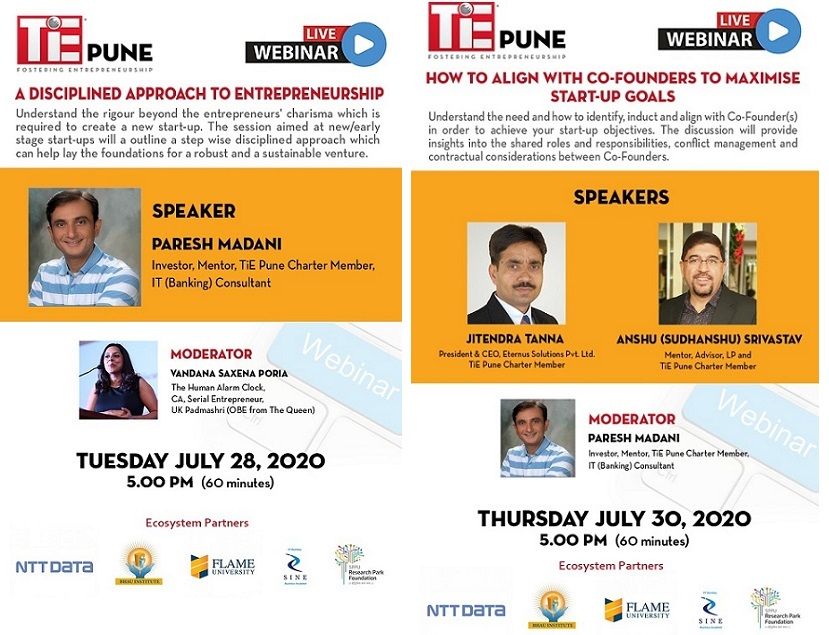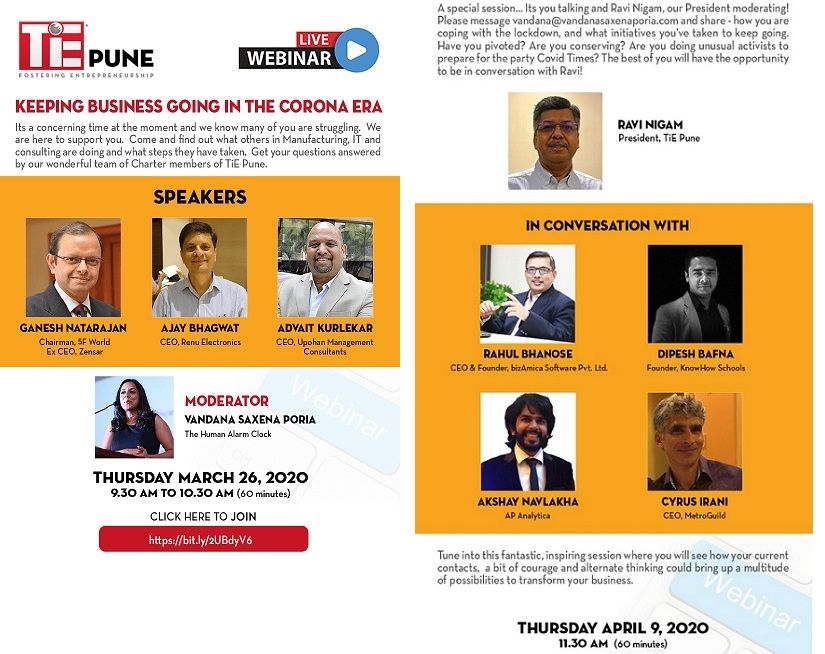Waves of successive lockdowns in countries around the world have dealt a body blow to livelihoods and fortunes. But life must go on, and a range of entrepreneurship support organisations has stepped up to tackle the pandemic crisis. This includes TiE Pune, the local chapter of the global network The Indus Entrepreneurs, founded in Silicon Valley in 1992.

“As soon as the lockdown happened, our President Ravi Nigam asked me to take charge of doing something for our members,” explains Vandana Saxena Poria, in a chat with YourStory. She is the founder of The Human Alarm Clock, and is a TiE Pune Charter Member (CM) in charge of member engagement.
Support for entrepreneurs
Vandana built a team with Anshu Srivastav (Mentor, Founder Institute), Smita Yedekar (CM, TiE Pune), and Paresh Madani (investor) and got in touch with a few of the younger Associate members. Vandana recalls, “They all had the same story: their primary worries were about their businesses surviving. How would they cope during the lockdown? Would it be extended?”
Her team realised the uncertainty was a big issue and that within TiE, there were senior CMs who had weathered various crises before. “We knew the key would be for our younger Associate members to get unfettered knowledge and access to the CMs,” Vandana says. This would support Associate members, and three key initiatives were started in this regard.
This included webinars on crucial topics twice a week; a WhatsApp group for Associate members and CMs to share thoughts and advice; and a confidential email service (reachout@TiEPune.org) for associate members to get one-on-one mentoring and advice.
Ramesh Mirakhur, Chair of ‘My Story’ Sessions, conducted forums with Atul Nishar, Chairman of Hexaware; Mini Menon, Founder and CEO of Live History India; Amit Naik, Founder and CEO of MetaMorphoSys; and Nitin Parab, Senior VP at Wipro.
Around 50 webinars have been held so far, twice a week on Tuesdays and Thursdays. The first month was COVID-19 focused, with CMs like Ganesh Natarajan (5F World), Hemant Jalan (Indigo Paints), and Ajay Bhagwat (Renu Electronics) discussing the pandemic’s impact on their businesses.
“Our Associate members told us that these sessions made them feel better that they were not alone in their struggles and that others were facing even bigger challenges, yet remaining calm,” Vandana explains.
There was also an exclusive session with Dr Ajay Shah, Director of CMIE. He dissected the impact of COVID-19 on the Indian economy. “He pointed out the green shoots and the potholes, and gaps such as the low rate of labour participation in India – 42 percent overall and a shocking low of 16 percent for women,” Ramesh recalls.
In May and June, TiE Pune’s webinars focus was on the improvement of business success for members. “Experts were invited to show how they could reduce costs, increase sales, and think about their business differently,” Vandana says.
Members also shared their own experience of successfully pivoting their businesses, or finding ways to take advantage of the COVID-19 context to improve their game.
July was a ‘HOW TO’ month, Vandana says. It addressed how to raise finance, put in metrics, brand one’s company, and brand oneself. “Again, we had experts from the community give real-life examples. Through this, we created over 25 decks on topics of interest, as well as transcripts of the sessions for members who may have missed them,” she adds.
There were outstanding webinars on ‘Startup Pitching’ with CM Darshan Doshi (Director of Entrepreneurship at Flame). Vandana herself took a session on ‘Beyond the New Normal Now – How to Future-Proof your Business by Changing your Mindset.’
The Tuesday webinars are only for TiE Pune members and incubatees, and draw around 70 participants. The Thursday webinars are open to all and average about 120 attendees, according to Vandana. The mix is 70 percent entrepreneurs, 15 percent legal and support roles, and 15 percent CMs.
Challenges and opportunities
Networking, funding, and mentoring are three key areas where entrepreneurs are facing challenges in the COVID-19 era, Vandana explains. For example, founders need to meet people who can help improve processes or increase sales. Virtual networking events and messaging forums help in this regard.
“Before speaking to funders, it’s important for entrepreneurs to understand what it means to be fundable, so we arrange sessions on this. Through TiE Pune Angels and the extensive connects TiE Pune has, we ensure that our members can be introduced to investors,” Vandana says.
“Having a sounding board can help deal with uncertainty. For this again, the chatter in the WhatsApp group is amazing. The CMs share their experience, and the associate members can reach out to them as a group or individually,” she adds.
In sectors like education and health, some entrepreneurs have been able to penetrate deeper into a number of clients which will bring them business for the future, Vandana observes. These include SkillEdge (edtech) and Apex Funds (fund management).
Organisational capacity
The TiE Pune team says the past four months have been incredibly busy as they are working round the clock to support the membership as well as organise virtual events. “They have all increased their computer skills, from setting up webinars and payment gateways to running the webinars behind the scenes,” Vandana explains.
“We have expanded our Governing Council and created multiple groups to support initiatives. Fifteen of our Associate Members will also be involved in specific activities starting next month,” adds Anshu Srivastav, CM in charge of Associate member engagement.
The government has initiated multiple initiatives for startups, some of which are listed on the Startup India portal. “Startups can partner with industries for co-creation, such as Novartis NSBX and Capgemini Innovation Challenge,” says Anshu. The government has also started funding programs for COVID-19-related startups and other new sectors.

Tips and advice
The TiE Pune team also offers advice and recommendations for entrepreneurs in these tough times. “If cash is tight, focus on survival at the moment. Cut everything that is not needed, but ensure your work to key clients does not suffer,” Vandana urges. Anshu has also published a LinkedIn post on this topic, titled Slash to Survive: Cash is King.
“Be in constant communication with everyone: your customers, to ask them to support you with payments on time, and your suppliers if you need to extend credit periods,” Vandana adds. It is important to communicate to employees as well to keep morale up and keep them motivated, even if salaries are to be cut.
“Look for alliances and partnerships that can increase your distribution channels and route to other markets,” Vandana advises. She also offers tips on pivoting to new or adjacent domains.
“We have seen the most successful pivots coming from companies that are going into allied areas. For example, training companies are going online and using polls, breakout rooms, and videos to enhance teaching,” she observes.
IoT startups are building contact-less solutions for the workplace. Health-tech startups are roping in experts to help find solutions for COVID-19, such as detecting symptoms. “These new products get them into hospitals and medical facilities that they would not have had access to before,” Vandana explains.
Upcoming activities
TiE Pune has drawn up event plans for the next two months as well. “August is dedicated to webinars on growth,” Vandana explains. Confirmed speakers include Anand Deshpande (Persistent Systems) on Innovation and the Persistent Way; Hemant Jalan (Indigo Paints) on Going Local and Building Businesses across India; and Ajit Patil (deepTek) and Ravi Nigam (ex-TastyBite) on Going Global.
Sessions on Identifying and Working with Ecosystem Partners will be held by Vishwas Mahajan, Ganesh Natarajan, and Pratima Kirloskar. Prashant Bhaskar, Devendra Deshmukh and Jitendra Tanna will speak on Successful Employee and HR practices.
September is dedicated to future trends, in manufacturing, IT services, data and analytics, and women entrepreneurship. “The aim is to give members insights on cutting edge trends to help them with their own business development,” says Vandana.
Another upcoming initiative is Value Circles, where a CM meets with a group of eight Associate members each month for a number of months. The aim is to support and mentor the group.
The road ahead
In these tough times, physical and mental health are key as well for entrepreneurs. “Ensure work-life balance when working from home. Stick to fixed routines which includes breaks. Join online fitness programs for yoga, meditation, and the like,” Anshu advises founders and their teams.
“We are encouraging entrepreneurs to change their mindset to get comfortable with being uncomfortable,” Vandana evocatively describes. She advises them to network with peers, and learn from those who are moving ahead.
“Understanding that this too shall pass, as all previous crises have,” Vandana signs off.
(Edited by Saheli Sen Gupta)
Want to make your startup journey smooth? YS Education brings a comprehensive Funding Course, where you also get a chance to pitch your business plan to top investors. Click here to know more.
Link : https://yourstory.com/2020/07/tie-pune-startups-coronavirus-entrepreneurs
Author :- Madanmohan Rao ( )
July 28, 2020 at 10:32AM
YourStory


